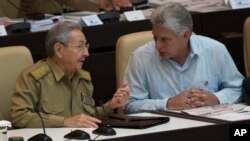Cuba's parliament convened Friday for one of its twice-annual plenary sessions amid warnings from government officials that the country needs to cut energy use and as many islanders hoped for deepened economic reforms.
The National Assembly was expected to approve an economic roadmap that emerged from a spring Communist Party congress. The reforms begun six years ago under President Raul Castro have allowed a smattering of private-sector activity, although the state still controls crucial areas of the economy.
Officials warned this week that falling prices of exports and other economic problems mean Cubans need to adopt power- and fuel-saving measures. So far those have included reduced bus services, cutting back on air conditioning at public offices, reduced work days at some state buildings and slashing fuel allotments for government vehicles by half.
The official website Cubadebate reported that vice president and economic czar Marino Murillo said the economy grew by 1 percent in the first semester — short of expectations — leaving the country short on cash.
He said the energy restrictions aim to reduce electricity consumption by 6 percent without affecting residential supply, which is responsible for about 60 percent of power consumption. Vital services and key revenue-generating sectors such as tourism, nickel production and other prioritized areas will not see cuts.
"We are going to face limitations in the second semester," Murillo was quoted as saying.
Cubadebate said Castro and 505 members of parliament opened the full session at a convention center in Havana. International media were not allowed access to the gathering.
Lawmakers have been meeting in committee during the week to discuss matters such as Cuba's chronic housing crisis, food quality and customs regulations.
Cuba's is not a professional parliament. Instead, members keep their normal jobs and gather twice a year to approve laws.
Also Friday, a government notice published in Communist Party newspaper Granma said Abel Prieto, a well-known writer, professor and intellectual, has been reappointed as the country's minister of culture.
Prieto held the same post from 1997 until 2012, when he was replaced and named a special adviser to the president and the Council of State. He replaces current Culture Minister Julian Gonzalez Toledo.




